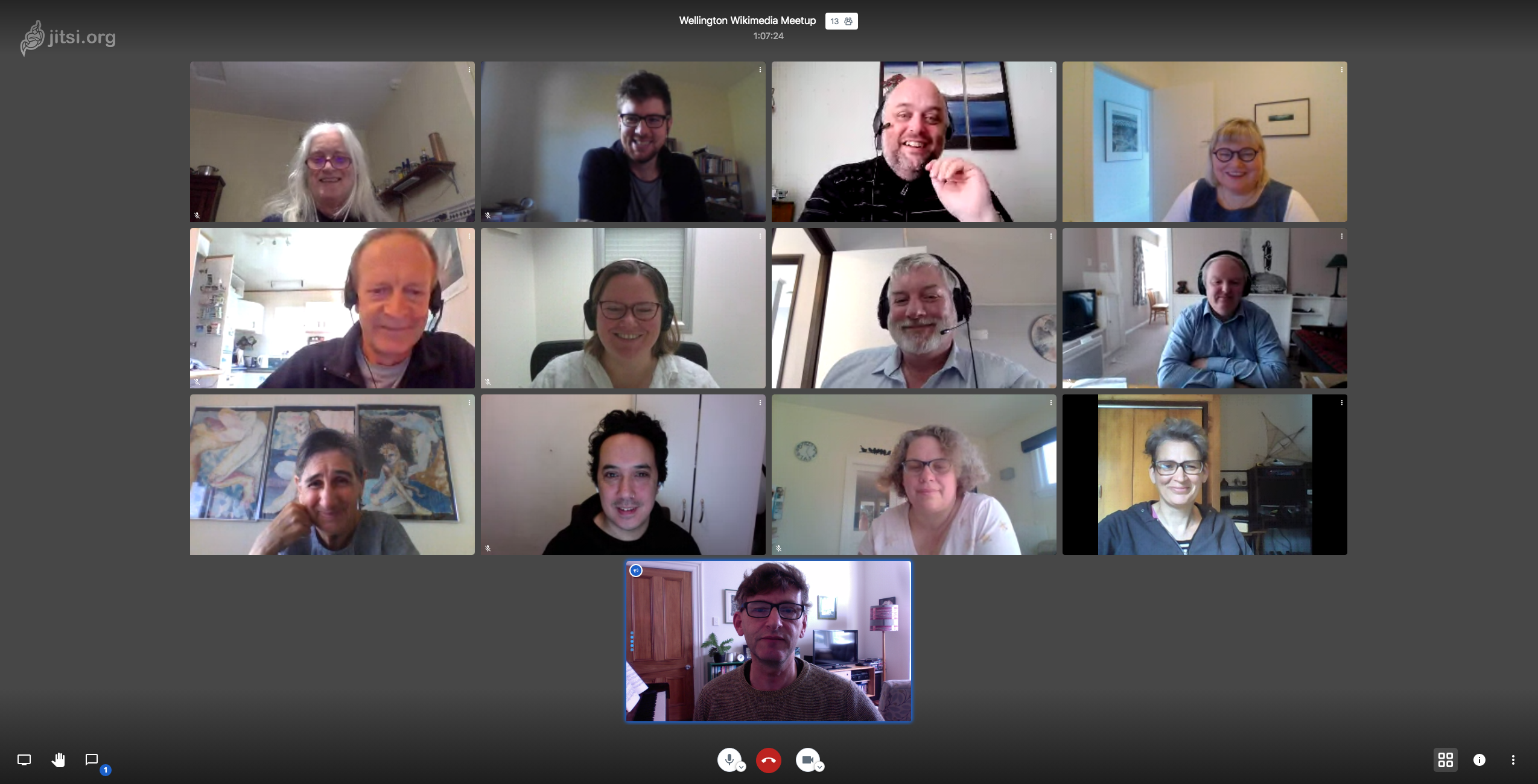|
Jingle (protocol)
Jingle is an extension to XMPP (Extensible Messaging and Presence Protocol) which adds peer-to-peer (P2P) session control (signaling) for multimedia interactions such as in Voice over IP (VoIP) or videoconferencing communications. It was designed by Google and the XMPP Standards Foundation. The multimedia streams are delivered using the Real-time Transport Protocol (RTP). If needed, NAT traversal is assisted using Interactive Connectivity Establishment (ICE). , the proposed Jingle specification had not yet been approved by the XMPP Standards Foundation, but is now a Draft Standard, meaning: "''Implementations are encouraged and the protocol is appropriate for deployment in production systems, but some changes to the protocol are possible before it becomes a Final Standard.''" The libjingle library, used by Google Talk to implement Jingle, has been released to the public under a BSD license. It implements both the current standard protocol and the older, pre-standard version. ... [...More Info...] [...Related Items...] OR: [Wikipedia] [Google] [Baidu] |
Psi (instant Messaging Client)
Psi is a free instant messaging client for the XMPP protocol (including such services as Google Talk) which uses the Qt toolkit. It runs on Linux (and other Unix-like operating systems), Windows, macOS and OS/2 tp://ftp.netlabs.org/pub/qtapps/psi.zip Psi build for OS/2 Version 0.15, ZIP package. (including eComStation and ArcaOS). User interface of program is very flexible in customization. For example, there are "multi windows" and "all in one" modes, support of different iconsets and themes. Ready-to-install deb and RPM packages are available for many Linux distributions. Successful ports of Psi were reported for Haiku, FreeBSD and Sun Solaris operating systems. Due to Psi's free/open-source nature, several forks have appeared, which occasionally contain features that may appear in future official Psi versions. Project name 'Psi' is the twenty-third letter of the Greek alphabet (Ψ), which is used as the software's logo. Mission statement The goal of the Psi pro ... [...More Info...] [...Related Items...] OR: [Wikipedia] [Google] [Baidu] |
Telepathy (software)
Telepathy is a software framework which can be used to make software for interpersonal communications such as instant messaging, Voice over IP or videoconferencing. Telepathy enables the creation of communications applications using components via the D-Bus inter-process communication mechanism. Through this it aims to simplify development of communications applications and promote code reuse within the free software and open source communities by defining a logical boundary between the applications and underlying network protocols. Implementations There are free software implementations of various protocols that export Telepathy interfaces: * Gabble: for XMPP, including support for Jingle * Butterfly: for Windows Live Messenger * Idle: for Internet Relay Chat * Salut: for the link-local XMPP protocol * Haze: for accessing protocols supported by libpurple, the library used by the Pidgin messaging client. This was done as a Google Summer of Code project in 2007. * Spirit: for the ... [...More Info...] [...Related Items...] OR: [Wikipedia] [Google] [Baidu] |
Yate (telephony Engine)
Yate (Yet Another Telephony Engine) is free and open source communications software with support for video, voice and instant messaging. It is an extensible PBX under the GPL-2.0-only license. It is written in C++ with a modular design, allowing the use of scripting languages like Perl, Python and PHP to create external functionality. History In 2004, NullTeam, the company behind Yate, launched the official website. In 2005 Sangoma announced their support for Yate development on the Microsoft Windows platform. On May 4, 2011 sipgate announced that it had chosen the Yate project for its core infrastructure. Yate version 5.0 was released in January 2014. Architecture Yate's architecture is based on a message passing system. The architecture can be divided into 4 main parts: * Core, where encapsulations for sockets, threads and other primitives can be found. * Message Engine, message-related classes, used to exchange data between modules. * Telephony Engine, telephony-rela ... [...More Info...] [...Related Items...] OR: [Wikipedia] [Google] [Baidu] |
Quiet Internet Pager
QIP (; an acronym for Quiet Internet Pager) is a multiprotocol instant messaging client. It is a closed source freeware program originally developed by Ilgam Zyulkorneev. In 2008 it was bought by RosBusinessConsulting media group and named most popular RBC service in 2009. Features A Softpedia review of QIP 2006 mentioned its unique feature (at the time) of tabbed message windows—instead of a message window for each chat session, one window with several tabs is shown. Since this feature's introduction, ICQ Version 6.0 now includes this feature, as do the multi-service clients Pidgin, Miranda NG, and Trillian. Other features include integrated mail.ru e-mail client, and a wider range of emoticons. QIP presents no advertisements in the application windows; this is described as a security advantage.Ilascu, Ionut (February 28, 2007)"Lonely No More"review. SoftPedia.com. Versions QIP 2005 QIP 2005 is an alternative instant messaging client based on the OSCAR pro ... [...More Info...] [...Related Items...] OR: [Wikipedia] [Google] [Baidu] |
Pidgin (software)
Pidgin (formerly named Gaim) is a free and open-source multi-platform instant messaging client, based on a library named libpurple that has support for many instant messaging protocols, allowing the user to simultaneously log in to various services from a single application, with a single interface for both popular and obsolete protocols (from AOL to Discord), thus avoiding the hassle of having to deal with a new software for each device and protocol. , the number of Pidgin users was estimated to be over three million. Pidgin is widely used for its Off-the-Record Messaging (OTR) plugin, which offers end-to-end encryption. For this reason it is included in the privacy- and anonymity-focused operating system Tails. History The program was originally written by Mark Spencer, an Auburn University sophomore, as an emulation of AOL's IM program AOL Instant Messenger on Linux using the GTK+ toolkit.Herper, Matthew (July 16, 2002)"Better Instant Messaging Through Linux"Forbes. ... [...More Info...] [...Related Items...] OR: [Wikipedia] [Google] [Baidu] |
Monal (software)
A monal is a bird of genus ''Lophophorus'' of the pheasant family, Phasianidae. Description The males all have colorful, iridescent plumage. Their physique is rather plump. Their diet consists of plants such as roots and bulbs and insects. During mating the males are polygamous where they mates with several females. The females in turn only mate with the selected male and enter into a monogamous relationship. Due to habitat destruction Habitat destruction (also termed habitat loss and habitat reduction) is the process by which a natural habitat becomes incapable of supporting its native species. The organisms that previously inhabited the site are displaced or dead, thereby ... and hunting, they have become rare and their population is endangered. Species There are three species and several subspecies: References External links * * * Bird genera {{Galliformes-stub ... [...More Info...] [...Related Items...] OR: [Wikipedia] [Google] [Baidu] |
Miranda NG
Miranda NG is an open-source multiprotocol instant messaging application, designed for Microsoft Windows. Miranda NG is free software distributed under the GNU GPL-2.0-or-later. History In May 2012 Miranda IM was forked to Miranda NG (New Generation). The reasons were a shift in the development team and the slow-paced development of the original Miranda IM. The main differences between the original client and the fork are: a switch to Visual Studio 2010's compiler, dropping support for Windows 95/98/ME and non-Unicode plugins, and the fact that the core and plugins development was combined and that they share a unified repository. the latest version of Miranda NG is 0.96.1, released on 2 June 2022. Architecture Miranda IM provides a basic client framework, GUI, and an advanced plugin architecture. Support for various IM protocols and additional features is implemented through optional plugins, some of which come bundled with Miranda IM by default; the rest (over 500) were i ... [...More Info...] [...Related Items...] OR: [Wikipedia] [Google] [Baidu] |
Kopete
Kopete is a multi-protocol, free software instant messaging client released as part of the KDE Software Compilation. Although it can run in numerous environments, it was designed for and integrates with the KDE Plasma Workspaces. Kopete was started because ICQ blocked Licq from their network in 2001. According to the original author, Duncan Mac-Vicar Prett, the name comes from the Chilean Spanish word ''copete'', meaning "a drink with your friends". Kopete has been nominated for multiple awards. (2nd place, Favorite Instant Messaging Client) (Best Communications Software, Runner Up) The designated successor is KDE Telepathy from the KDE RTCC Initiative. Protocols Kopete allows users to connect to the following protocols: MSNP (Microsoft Messenger service, commonly known as ''MSN'', ''.NET'', or ''Live'') was also supported until the protocol was discontinued by Microsoft. Features Plugins By default, Kopete supports the following plugins (not all of which are currently ... [...More Info...] [...Related Items...] OR: [Wikipedia] [Google] [Baidu] |
KDE Telepathy
KDE Telepathy is an instant messaging (IM) and voice over IP (VoIP) client which supports text, voice, video, file transfers, and inter-application communication over various IM protocols. It uses the Telepathy framework as its back-end. It is the slated replacement for Kopete, and its main focus is the integration between different components of the KDE Software Compilation that may benefit from real-time communication and collaboration features. Themes KDE Telepathy has support for Adium themes. They can be installed from the Adium website's Xtras page's Themes category. They are installed over ktp-adiumxtra-protocol-handler Protocol support *Gadu-Gadu - over telepathy-haze *Skype for Business - over telepathy-haze *Telegram Messenger - over telepathy-morse *Skype - over telepathy-haze * ICQ - over telepathy-haze *Bonjour - over telepathy-salut *XMPP - over telepathy-gabble (broken X-OAuth2) *Yahoo! Messenger - over telepathy-haze * AIM - over telepathy-haze See also *Com ... [...More Info...] [...Related Items...] OR: [Wikipedia] [Google] [Baidu] |
Java (programming Language)
Java is a high-level, class-based, object-oriented programming language that is designed to have as few implementation dependencies as possible. It is a general-purpose programming language intended to let programmers ''write once, run anywhere'' ( WORA), meaning that compiled Java code can run on all platforms that support Java without the need to recompile. Java applications are typically compiled to bytecode that can run on any Java virtual machine (JVM) regardless of the underlying computer architecture. The syntax of Java is similar to C and C++, but has fewer low-level facilities than either of them. The Java runtime provides dynamic capabilities (such as reflection and runtime code modification) that are typically not available in traditional compiled languages. , Java was one of the most popular programming languages in use according to GitHub, particularly for client–server web applications, with a reported 9 million developers. Java was originally developed ... [...More Info...] [...Related Items...] OR: [Wikipedia] [Google] [Baidu] |
Jitsi
Jitsi is a collection of free and open-source multiplatform voice (VoIP), video conferencing and instant messaging applications for the web platform, Windows, Linux, macOS, iOS and Android. The Jitsi project began with the Jitsi Desktop (previously known as SIP Communicator). With the growth of WebRTC, the project team focus shifted to the Jitsi Videobridge for allowing web-based multi-party video calling. Later the team added Jitsi Meet, a full video conferencing application that includes web, Android, and iOS clients. Jitsi also operates meet.jit.si, a version of Jitsi Meet hosted by Jitsi for free community use. Other projects include: Jigasi, lib-jitsi-meet, Jidesha, and Jitsi. Jitsi has received support from various institutions such as the NLnet Foundation, the University of Strasbourg and the Region of Alsace, the European Commission and it has also had multiple participations in the Google Summer of Code program. History Work on Jitsi (then SIP Communicator) started in ... [...More Info...] [...Related Items...] OR: [Wikipedia] [Google] [Baidu] |



